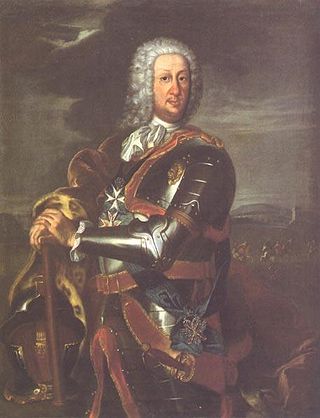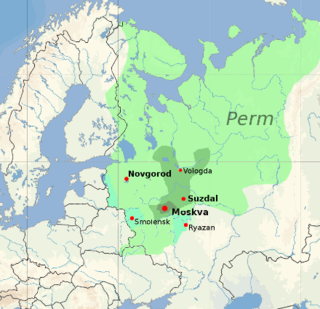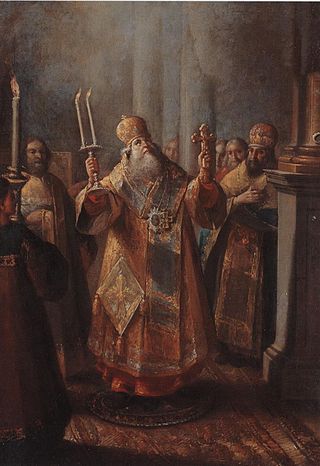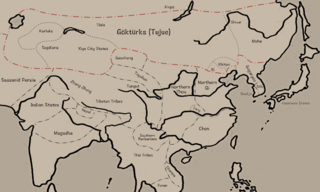Related Research Articles

Catherine II, most commonly known as Catherine the Great, was the reigning empress of Russia from 1762 to 1796. She came to power after overthrowing her husband, Peter III. Under her long reign, inspired by the ideas of the Enlightenment, Russia experienced a renaissance of culture and sciences, which led to the founding of many new cities, universities, and theatres, along with large-scale immigration from the rest of Europe and the recognition of Russia as one of the great powers of Europe.

Peter I, was Tsar of all Russia from 1682, and the first Emperor of all Russia, known as Peter the Great, from 1721 until his death in 1725. He reigned jointly with his half-brother Ivan V until 1696. From this year, Peter was an absolute monarch, an autocrat who remained the ultimate authority and organized a well-ordered police state.

The Great Northern War (1700–1721) was a conflict in which a coalition led by the Tsardom of Russia successfully contested the supremacy of the Swedish Empire in Northern, Central and Eastern Europe. The initial leaders of the anti-Swedish alliance were Peter I of Russia, Frederick IV of Denmark–Norway and Augustus II the Strong of Saxony–Poland–Lithuania. Frederick IV and Augustus II were defeated by Sweden, under Charles XII, and forced out of the alliance in 1700 and 1706 respectively, but rejoined it in 1709 after the defeat of Charles XII at the Battle of Poltava. George I of Great Britain and the Electorate of Hanover joined the coalition in 1714 for Hanover and in 1717 for Britain, and Frederick William I of Brandenburg-Prussia joined it in 1715.

Ivan IV Vasilyevich, commonly known as Ivan the Terrible, was Grand Prince of Moscow and all Russia from 1533 to 1547, and the first Tsar and Grand Prince of all Russia from 1547 until his death in 1584. Ivan's reign was characterised by Russia's transformation from a medieval state to a fledgling empire, but at an immense cost to its people and long-term economy.

The Treaty of Nystad was the last peace treaty of the Great Northern War of 1700–1721. It was concluded between the Tsardom of Russia and the Swedish Empire on 10 September [O.S. 30 August] 1721 in the then Swedish town of Nystad. Sweden had settled with the other parties in Stockholm and in Frederiksborg (1720).

Count Boris Petrovich Sheremetev was an Imperial Russian diplomat and general field marshal during the Great Northern War. He became the first Russian count in 1706. His children included Pyotr Sheremetev and Natalia Sheremeteva.

The Battle of Ösel Island took place on May 24(4 June), 1719 (O.S.), during the Great Northern War. It was fought near the island of Saaremaa (Ösel).

The Legend of the Invisible City of Kitezh and the Maiden Fevroniya is an opera in four acts by Nikolai Rimsky-Korsakov. The libretto was written by Vladimir Belsky, and is based on a combination of two Russian legends: those of Saint Fevroniya of Murom and of the city of Kitezh, which became invisible when attacked by the Tatars. The opera was completed in 1905, and the premiere performance took place at the Mariinsky Theatre in St. Petersburg, on February 7, 1907, the last in Rimsky-Korsakov's lifetime.

Russo-Turkish wars or Russo-Ottoman wars were a series of twelve wars fought between the Russian Empire and the Ottoman Empire between the 16th and 20th centuries. It was one of the longest series of military conflicts in European history. Except for the war of 1676–1681, Pruth River Campaign and the Crimean War, the conflicts ended in losses for the Ottoman Empire, which was undergoing a long period of stagnation and decline; conversely, they showcased the ascendancy of Russia as a European power after the modernization efforts of Peter the Great in the early 18th century.

This list contains a selection of books on World War I, using APA style citations.

The Russian Empire was a vast empire that spanned most of northern Eurasia from its proclamation in November 1721 until the proclamation of the Russian Republic in September 1917. At its height in the late 19th century, it covered about 22,800,000 km2 (8,800,000 sq mi), roughly one-sixth of the world's landmass, making it the third-largest empire in history, behind only the British and Mongol empires. It also colonized North America between 1799 and 1867. The empire's 1897 census, the only one it conducted, found a population of 125.6 million with considerable ethnic, linguistic, religious, and socioeconomic diversity.

The Principality of Moscow or Grand Duchy of Moscow, also known simply as Muscovy, was a principality of the Late Middle Ages centered on Moscow. It eventually evolved into the Tsardom of Russia in the early modern period. The princes of Moscow were descendants of the first prince Daniel, referred to in modern historiography as the Daniilovichi, a branch of the Rurikids.

The emperor and autocrat of all Russia, also translated as emperor and autocrat of all the Russias, was the official title of the Russian monarch from 1721 to 1917.

Ivan Ivanovich Belsky was a Russian painter. He was part of the "Belsky Dynasty" of painters of the Eighteenth Century and one of the first teachers at the Imperial Academy of Arts, where he taught history painting.

This is a bibliographyof works on World War II.
The following article lists events that happened during the year 1799 in Russia.

This is a timeline of the Göktürks from the origins of the Turkic Khaganate to the end of the Second Turkic Khaganate.
Scottish Russians are Russians with full or partial Scottish ancestry. Scottish migration to Russia occurred primarily during the early 17th-century Polish–Muscovite War, the Ingrian War, and the Thirty Years' War. Some estimates of the number of Scottish settlers in Russia during the 17th century are as high as 100,000. This has led some demographers to believe that the current number of Scottish Russians could be up to 1 or 2 million. There are believed to be around 400 different Russian surnames that owe their names to Scottish ancestors.
References
- ↑ Jaques, Tony (2006-11-30). Dictionary of Battles and Sieges [3 volumes]: A Guide to 8,500 Battles from Antiquity through the Twenty-first Century [3 volumes]. Bloomsbury Publishing USA. ISBN 978-0-313-02799-4.
- ↑ "The Art of the Belskys". rusmuseumvrm.ru. Retrieved 2024-02-14.
- ↑ Sommer, Debora (2013-10-23). Eine baltisch-adlige Missionarin bewegt Europa: Barbara Juliane v. Krüdener, geb. v. Vietinghoff gen. Scheel (1764–1824) (in German). V&R Unipress. ISBN 978-3-8470-0149-2.
- ↑ Hughes, Lindsey (2008-10-01). Peter the Great: A Biography. Yale University Press. ISBN 978-0-300-14374-4.
- ↑ Bushkovitch, Paul (2001-09-27). Peter the Great: The Struggle for Power, 1671–1725. Cambridge University Press. ISBN 978-1-139-43075-3.
- ↑ Laima, Rita (2017-04-25). Skylarks and Rebels: A Memoir about the Soviet Russian Occupation of Latvia, Life in a Totalitarian State, and Freedom. Columbia University Press. ISBN 978-3-8382-6854-5.
- ↑ Quiller-Couch, Arthur (2008-09-18). Studies in Literature: First Series. Cambridge University Press. ISBN 978-0-521-73675-6.